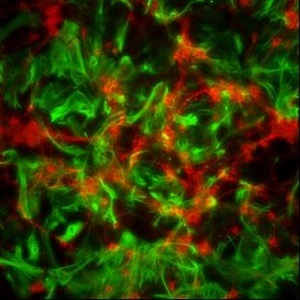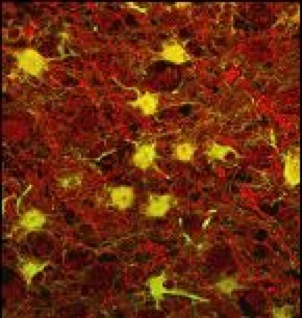
 David A. Hinkle, MD, PhD
David A. Hinkle, MD, PhD
Assistant Professor of Neurology
Movement Disorders Division
Pittsburgh Institute for Neurodegenerative Diseases
David Hinkle received his BS from Villanova University and his MD and PhD from the University of Maryland School of Medicine. He then completed an Internal Medicine internship, Neurology residency, Movement Disorders clinical fellowship, and a Neurobiology basic science fellowship at the University of Pennsylvania School of Medicine. While at Penn he received the Arthur K. Asbury Award for Clinical Excellence in Neurology, and his research fellowship was supported by an NIH National Research Service Award. He was recruited to the University of Pittsburgh in 2004 as a member of the Neurology and PIND faculty..
Dr. Hinkle’s lab is interested in the role that astrocytes, a prominent type of neuronal support cell in the central nervous system, play in the brain’s attempts to protect itself against Parkinson’s disease (PD) initiation and progression. This process, called “astrocyte-mediated neuroprotection,” is a thus far unexplored avenue for the potential future development of disease-modifying therapies against PD. He is particularly interested in the potential contributions of an astrocyte-expressed protein, DJ-1, to the process of astrocyte-mediated neuroprotection in PD. This protein is robustly expressed in Parkinson’s disease reactive astrocytes (which abundantly survive the course of the disease), but not neurons, suggesting that its expression may play a role in mechanisms of astrocyte self-protection as well as astrocyte-mediated protection of surrounding neurons. This theory is supported by the fact that some genetic forms of PD are caused by mutations in DJ-1 that do not allow its expression. His lab has recently published data showing that DJ-1 knock-down in astrocytes reduces their neuroprotective capacity against rotenone, that astrocytic DJ-1 over-expression augments this capacity, and that in each case astrocyte-released factors appear to be involved in the mechanism.
Dr. Hinkle’s lab is supported by grants from the NINDS/NIH (K08), the American Parkinson Disease Association (George C. Cotzias Fellowship), and the National Parkinson Foundation (IRGP) to study the mechanisms of DJ-1 dependent astrocyte-mediated neuroprotection in PD-relevant model systems. His lab is also interested in expanding its research efforts beyond DJ-1 to identify other mechanisms of astrocyte-mediated neuroprotection that may one day be targeted for PD disease-modifying therapies.
Recent Publications:
- Mullett SJ, Hamilton RL, Hinkle DA. DJ-1 immunoreactivity in human brain astrocytes is dependent on infarct presence and infarct age. Neuropathology 29:125-131, 2009.
- Bai Q, Mullett SJ, Garver JA, Hinkle DA, and Burton EA. Zebrafish DJ-1 is evolutionarily conserved and expressed in dopaminergic neurons. Brain Research 1113:33-44, 2006.
- Mullett SJ, Hinkle DA. DJ-1 knock-down in astrocytes impairs astrocyte-mediated neuroprotection against rotenone. Neurobiology of Disease 33:28-36, 2009.
- Mullett SJ, Hamilton RL, Hinkle DA. DJ-1 immunoreactivity in human brain astrocytes is dependent on infarct presence and infarct age. Neuropathology 29:125-131, 2009.
- Hinkle DA and Eberwine J. Single-cell molecular biology: Implications for the diagnosis and treatment of neurological disease. Biological Psychiatry 54(4): 413-417, 2003.
- Rizzu P, Hinkle D, Zhukareva V, Bonifati V, Severijnen LA, Martinez D, Ravid R, Kamphorst W, Eberwine JH, Lee VMY, Trojanowski JQ, and Heutink P. DJ-1 co-localizes with pathological tau inclusions: A link between Parkinsonism and dementia. Annals of Neurology 55(1): 113-118, 2004.
- Davis JE, Eberwine JH, Hinkle DA, Marciano PG, Meaney DF, and McIntosh TK. Single cell gene expression profiling for CNS injury. Neurochemical Research 29(6):1113-1121, 2004.
- Hinkle DA, Glanzer J, Sarabi A, Pajunen T, Zielinski J, Belt B, Miyashiro K, McIntosh T, and Eberwine J. Single neurons as experimental systems in molecular biology. Progress in Neurobiology 72(2):129-142, 2004.
- Bai Q, Mullett SJ, Garver JA, Hinkle DA, and Burton EA. Zebrafish DJ-1 is evolutionarily conserved and expressed in dopaminergic neurons. Brain Research 1113:33-44, 2006.
- Mullett SJ, Nath A, Hinkle DA. DJ-1 knock-down in astrocytes impairs astrocyte-mediated neuroprotection. Submitted.
- Mullett SJ, Hamilton RL, Hinkle DA. Reactive human infarct astrocytes express DJ-1 in an infarct age-dependent manner. Submitted.
Hinkle Lab Members:
Beth Gabris - Research Technician
Nicole Larson - Postdoc
Steve Mullett - Lab Chief
Giulia Ambrosi - Visiting Scholar

